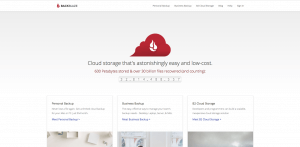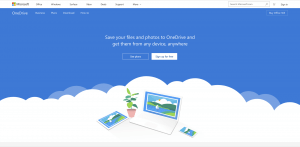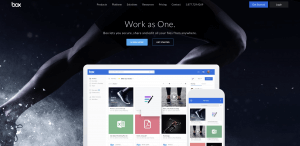Top 6 Alternatives to Dropbox & How Reviews Can Help You Pick The Right One for Your Business
Full disclosure: I was skeptical of Dropbox some years ago when I first heard about folks using it to back up their personal and professional data. Fast-forward to 2018 and my doubts seem quaint in retrospect, as I now constantly rely on cloud storage providers to secure my most important files and information.
The rest comes from knowing a bit about what cloud storage is and how it works. As you probably know, cloud storage offers a slew of practical advantages over old-fashioned data storage via local drives. These include:
- Your data being available on various devices in various locations
- The ability to access, search, edit, and synchronize your data across devices at the push of a button or on an automated schedule
- The ability to support all the file types you use, including audio, video, text documents, and digital images
- Many cloud storage apps integrate with others to allow the easy sharing, editing, and playback of your data across platforms and devices
Cloud storage solutions have much to offer anyone with data to manage. But many of their features are geared towards businesses rather than individuals. Security and admin features, for instance, are designed for companies where sensitive data accessibility and security are crucial assets in themselves.
Businesses have caught on to the many benefits cloud hosting services have to offer. Benefits that businesses reap include:
- Cost savings: Corporations no longer have to invest in and maintain their own hardware. The cloud storage service provider covers all the maintenance and management of your file storage and sharing solutions. As a result, this means more energy and resources can be put into the creation of your product or service
- Mobility Opportunities: People no longer only work from one device. If they have a meeting out of the office or have to travel, chances are they’re using their phones or laptops. Cloud storage solutions make all your files accessible across devices and not dependent on location.
- Collaboration tools: File sharing software are ideal for teams that collectively work on and edit spreadsheets, documents and other projects. In short, anything as simple as a logo that needs to be used by different team members can be shared on the cloud.
With these cloud storage basics in mind, let’s have a look at Dropbox–the most popular option on the market–and some effective alternatives to Dropbox.
 A Quick Look Into Dropbox
A Quick Look Into Dropbox
Dropbox is a file-hosting service that is used by individuals and companies to store multiple types of files and to share them with others. This is especially useful for teams that need to collaborate on files together.
Dropbox features file and version recovery, link-permissions, a team folder manager, dropbox paper, integrations with over 300,000 apps and more. It is also reputable for being highly secure.
Customers highlight how functional Dropbox is for file backup, sharing, and collaboration. Reviews also consistently point out how easy it is to use. It instantly makes files accessible on their desktops or mobile apps and easily integrates with other task management tools.
“We use it across the organization. It is a good backup with history support and helps me easily share content with different team members in my organization and/or clients.”
~ Oran Bar-Tal | Chief Operating Officer | Ginger Gene
Though Dropbox has its strengths, this software has areas where it can be improved. Users have reported issues with the desktop interface, complications with the syncing feature that have caused missing files, and if large amounts of data are deleted it can take a long time to restore them. Also, as cloud-based services have become more popular, Dropbox prices have remained high compared to the competition, according to some reviewers.
Pricing for an individual starts at free for the basic plan which includes 2GB of space. For an individual, the Plus plan is $8.25 a month and the Professional plan is $16.58 a month. For teams, the Standard plan is $12.50 per user/per month. Lastly, an Advanced plan costs $20 per user/per month.
Alternatives to Dropbox
Not all cloud-based file storage is the same. Although Dropbox is one of the most popular options, consider these alternatives to see what best fits your needs.
The top six alternatives to Dropbox are listed here alphabetically. They were selected as the most common comparisons to Dropbox, based on research patterns from TrustRadius’s powerful review aggregator. These six options are listed because they are rated at least 7.9 out of 10 and have at least 15 reviews.
1. Amazon Cloud Drive
Amazon’s file hosting and sharing app Cloud Drive enables users to put all of their digital files whether documents, music files, or videos in one place.
Common themes in user reviews of Amazon’s proprietary cloud storage platform include its availability across many devices via app and browser support. It is also praised for reliable integration with other apps and a friendly and highly knowledgeable support staff. Some users have singled out Cloud Drive’s desktop interface and download function for praise.
Whereas folders downloaded from other cloud apps, like Google Drive, arrive at your destination zipped, those downloaded from Cloud Drive arrive unzipped along with their contents.
“We use it for a our file/document sharing system, used across the entire company. Allows for access, independent of a lot of clunky systems and at reduced hardware costs.”
~ Mike Narumiya | Director, Data and Information Systems | North Central Texas Trauma Regional Advisory Council
Its price point varies depending on the size of the cloud storage purchased: 100 GB for $11.99; 1 TB for $59.99; and up to 30 TB for an added $59.99 per T (all prices per year).
2. Backblaze
Backblaze is an automatic cloud backup service for individuals and businesses. It features automatic backups or scheduled, auto threading and throttling, location services for stolen or lost computers, and you can restore versions up to 30 days.
It also features B2 Cloud Storage which allows you to store unlimited data storage in the cloud. Backblaze is ideal for those who work with digital media because there are no limits for those using large amounts of data.
One particularly positive theme among users is its flexibility in configuring a backup schedule tailored to an individual’s or company’s needs. Other reported virtues of Blackblaze include its relatively low drain on system resources. It is also simple, low-maintenance, and runs smoothly in the background. Others say the affordable pricing is a win for them.
“I use BackBlaze as a worry-free cloud backup solution for my laptops. It is crucial that I have my media (photographs, video footage, edited videos, etc.) stored in multiple locations and BackBlaze has been the best choice for my cloud backups. .”
~ Chris Tuley | Owner | The Ensworth School
Pricing varies if you are an individual, business or interested in the B2 Cloud Storage option. To get a full picture of Backblaze pricing, contact them directly.
3. Microsoft Office 365
Office 365 is an office suite rather than a pure cloud storage solution but features OneDrive. OneDrive is a cloud-based file storage platform. Unlike other options on this list, it allows users to store and create/work on files within the apps, rather than creating and working on them somewhere else and then storing them here. For example, Dropbox allows users to comment on PDF files and collaborate on revisions, but not actually edit the PDF within Dropbox.
User reviews consistently praise it for being so ubiquitous that subscribers can easily use it to work anywhere they like on any online device, including mobile access on any smartphone or tablet. Besides being so widely used, it is reported to have a very approachable learning curve, even for users new to cloud computing.
“Office 365 is the industry standard, so much easier to use in the business world. It is more robust than the competition and is a mature product.”
~ Tom Wondra | Consultant / Account Executive | Givenly
365’s pricing starts with the EnterpriseE1 plan at $8 per user/per month. The ProPlus plan is $12 per user/per month. The Enterprise E3 plan is $20 per user/per month. The Enterprise E5 plan is $35 per user/per month.
4. ShareFile
ShareFile is a cloud storage and sharing service geared towards business use cases. Reviewer demographics indicate that it is especially popular among small and mid-sized businesses.
Features include content collaboration, file sync, sending big files, and workflow management.
Users highlight its simplicity and ease of use. This includes smooth and seamless download, setup, and login experiences. Additionally, praise extends to the ability to configure templates for folders to make file organization uniform. Reviewers of ShareFile also mentioned expiring links and other data security measures among its strengths.
“We use ShareFile to send and receive large files from clients and other law firms. We are able to serve productions of documents no matter how large through email without clogging up our mailboxes with large file attachments.”
~ Heather Roberson | Litigation Paralegal | Sayles Werbner
ShareFile plans range from $16 – $295 monthly.
5. Evernote
Evernote is a software suite designed for cloud-based storing and sharing of notes, which include formatted text, voice memos, digital images, digitally handwritten files, and the like. The app permits users to create, tag, and attach comments or files to notes. They are then organized into folders that are synced across multiple devices and can be exported. It additionally features easy collaboration, sharing and “team” capabilities.
Specific features that reviewers praise include Evernote’s ability to scan and store business cards and other analog documents. Other highlighted features include PDF annotation, easily accessed presentation mode, generous storage, and a robust and precise internal search engine. Not to mention the elegance of the mobile app interface, keyword tagging feature, and Google Chrome extension which permits one-click collection of web content.
“Those who continue to use Evernote, including myself, use it as a repository of meeting notes, reminders, and lightweight asset management.”
~ Trent Sherrell | Senior Interaction Designer | CareerBuilder
A basic plan for an individual is free. A premium plan for an individual is $7.99 per month. A business plan is $149.99 per user/per year.
6. Box
Box is an online file-sharing, collaboration, and storage product. This is designed for teams to store shared files in the cloud and to be able to access, edit and comment on their files in real time from any device. Box also features key management, governance support, and caters to those with international data and residency requirements.
One common source of satisfaction with Box is the value it brings to collaboration. Box reviewers also highlight Box Notes as a strong collaborative tool as well, allowing many users to share, edit, and organize communal notes on meetings or projects.
“Box is used in my organization as our file sharing tool. We regularly use this for storing team files, training content, team notes, etc, in just about every part of our organization.”
~ Verified User | Program Manager in Customer Service | Computer Software Company
The most budget-friendly option for Box is the Starter plan for an which costs $5.80 per user/per month. The Business choice is $17.30 per user/per month. The Business Plus option is $28.50 per user/per month. Contact Box directly for their Enterprise option.
The Right Cloud Storage Option for Your Business
In our dash across the cloud, we have seen why online storage solutions can add considerable value to private individuals. They can especially add value to businesses ranging from small to midsize to enterprise.
Every business is different and seeking the right fit for file storage and sharing options. Consider what preferences you have for data security, file scanning options, note features, and pricing. Also, some cloud storage functions may be more ideal for larger corporations, offering tools like notifications for project managers.
Big names like Dropbox, Microsoft, and Google help set the standard for file-sharing and syncing software, but increasingly many other brands are making their mark and providing strong alternatives to these heavy hitters.
Hearing from others like you can help you make a confident decision, with eyes wide open to the benefits, costs, and tradeoffs with the cloud storage provider you choose.
Was this helpful?





